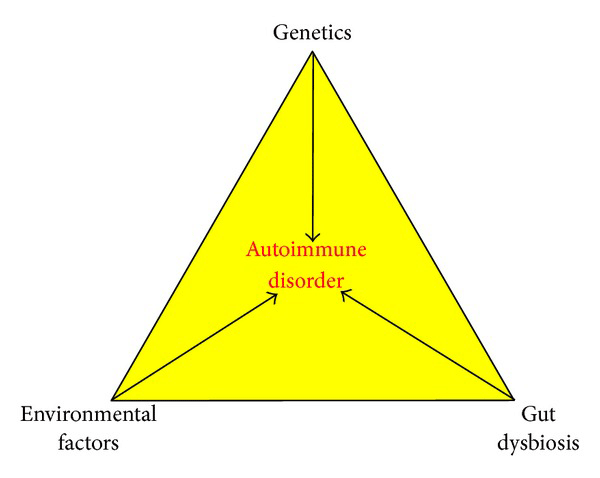By Sarah Russo

Sarah Russo is a writer, cannabis consultant, and a social media and content manager. She got her degree in environmental studies and social justice, with a focus in plant medicine from the Evergreen State College. She has previously worked for Project CBD and the Society of Cannabis Clinicians. She has also acted as an herbal medicine educator in natural remedy apothecary shops. Some of her main goals are diversifying the cannabis movement by integrating the plant into the greater herbal medicine compendium as well as encouraging sustainable agricultural practices.
While advancements in science have enabled a greater understanding of our health, getting to the root cause of a chronic disease can be challenging. Autoimmune conditions are an area of medicine that remain largely misunderstood. Presently, there are more than 80 registered autoimmune disorders, affecting various parts of the body. More conditions may also turn out to be autoimmune related.
Autoimmunity (AI) is an "attack on self", where the immune system gets triggered and thinks that the body's healthy tissues are invaders. Our immune system is mediated by beta cells which produce antibodies to foreign invaders. Beta cells produce antibodies to prevent infection or fend off bacterial and viral pathogens. T-cells are in charge of cell-mediated immunity are derived from the thymus and other immune tissues. They attack foreign invaders in the body. In an autoimmune response, T-cells take action as if the body's own cells were foreign in order to bring the body back into homeostasis. This self-attack is known as "molecular mimicry" and is the root of any autoimmune disease.
The location of the autoimmune attack will vary based on the condition. For example, if there is autoimmunity in the joints, rheumatoid arthritis may result. If molecular mimicry occurs in the thyroid, it may lead to Hashimoto's. For skin disorders like psoriasis, the dermal layer is the target. Autoimmune conditions may attack more than one part of the body at the same time. Lupus can manifest in the skin, digestive system, joints, and the brain.
The reason why the self-attack switch is turned on is relatively unknown. Common consensus is that those with autoimmunity have a genetic predisposition for these types of conditions. Then a particular event like an infection, parasite, leaky gut syndrome, or a traumatic experience sets off the autoimmune reaction.

The triangle of autoimmune triggers. Gut dysbiosis and genetic and environmental factors play mayor roles in the development of autoimmune diseases.
Taken from https://www.ncbi.nlm.nih.gov/pmc/articles/PMC4036413/figure/fig1/
AI can remain latent in the body, resulting in ailments that have not been properly pinpointed. Autoimmune related situations can linger in the body unexposed for many years, which can result in digestive complaints and various associated problems. Frequently, autoimmune diseases are misdiagnosed because their symptoms can mimic other ailments.
There has been a dramatic increase in the prevalence of autoimmune diseases since World War 2. Autoimmune conditions more commonly affect women than men. The National Institute of Health estimates that 23.5 million people in the USA have an autoimmune disease, while cancer affects 13 million in the country. The true number of those affected by autoimmunity is likely higher, due to misdiagnosis and general lack of understanding about the complexity of AI related conditions.
Conventional medicine ideology believes that the immune system cannot be controlled and once the autoimmunity switch has been triggered, it is impossible to revert back to the body's normal state. However, many alternative medical professionals feel that autoimmune conditions may be reversed or greatly resolved. In typical treatment protocols, patients are not given information about dietary changes and are generally told that pharmaceutical medications are required to get better.
Conventional treatments for autoimmune disorders
Currently, prescription medication for autoimmune diseases aim to "turn off" the immune system all together. Immunosuppressive drugs are synthetically created antibodies which attack the autoimmune antibodies. Immunosuppressive drugs can create many potential side effects. These medications may make someone more susceptible to infection, and may lead to the development of cancer. According to Dr. Bonni Goldstein, a cannabis friendly doctor in Southern California, many patients who try immunosuppressive medications end up discontinuing them due to unfavorable side effects. In her experience, patients seek holistic treatment options for autoimmune diseases.
Steroids are a commonly prescribed medication for autoimmunity to lower inflammation and suppress the immune system. They are meant to be taken on the short term. Julie Holland, a pro-cannabis psychiatrist based in New York, says that the goal shouldn't be to be globally immunosuppressed, "With steroids, you are sweeping the dirt under the carpet. You're not getting to the root cause at all. It's as if you're hitting mute on the alarm, but the alarm is going off for a reason." Steroids may decrease blood supply to various parts of the body, and create fat deposits in the face or other areas. If someone has autoimmunity and chronic pain, steroids may not help address the root of the discomfort.
In general, immunosuppressive therapy is incredibly expensive and not always effective. The aim should be to modulate the immune system and bring it back into balance, not to turn it off completely.
What options exist for someone with an autoimmune condition if they do not wish to use traditional medications? Holistic approaches for autoimmune conditions are to decrease inflammation, repair the digestive tract, and regulate the immune system. This includes getting rid of stressors and sensitivities on the broad spectrum, including environmental, food, chemical, and others. Managing autoimmune disease requires dietary and lifestyle changes, which have been reported to help reverse these conditions.
Someone with an autoimmune disease may consider cannabinoid therapies for their ability to decrease inflammation, modulate the immune system, and help to bring the system back into balance.
Immune system modulation
The immune system is a delicate balancing act and deeper investigation is needed to better understand the mechanisms of how it works. Herbs and foods that work to modulate the immune system are ideal for someone dealing with an autoimmune condition. Cannabis therapy and dietary changes seem to be safer, cheaper, and possibly more effective for combating autoimmune conditions than pharmaceutical medications.
Cannabis and other adaptogenic herbs are known to be immune modulating. They act as a regulating tool: they can bring an over or under-reacting immune system back into balance. However, the difference between "immune modulating" and "immune boosting" can be tricky to decipher. It is generally felt that someone with autoimmunity would not want to take anything which boosts the immune system, but this is a point of contention among practitioners.
According to Kevin Spelman, faculty member in Botanical Medicine at National University of Natural Medicine, the definition of immune modulatory is the biphasic effect of an herbal medicine. "Immunomodulatory herbs offer a very beneficial strategy to treat autoimmune conditions. The category of immunomodulation rests on biphasic activity. If someone's immune response is overly vigilant, there would be a down regulation of immune response. If someone's immune response is 'deficient' there would be an increase of immune activity." Spelman explained that a patient's therapeutic response is dependent on how their individual molecular environment is behaving.
Cannabis is a unique biphasic botanical remedy that can bring the system back into balance in numerous regards. Based on current research, cannabis therapies may provide benefit for autoimmune disease in three basic ways: modulation of the immune system, decreasing general inflammation, and helping to assist the digestive system. Cannabis medicine may also treat symptoms of specific autoimmune diseases like ALS, rheumatoid arthritis, ulcerative colitis and Crohn's, fibromyalgia, Huntington disease, multiple sclerosis, and others. The plant may decrease chronic pain, inflammation, and spasms associated with some of these conditions. There have been few specific investigations on cannabinoid treatment for AI, due to federal prohibition on human clinical trials. However, extensive studies in test-tubes and in animals have reported the anti-inflammatory benefits of cannabinoids for specific AI conditions like multiple sclerosis and rheumatoid arthritis.
Investigation has demonstrated that CB2 receptors regulate many complex pathways of the immune system. Preclinical studies show that triggering CB2 receptors can suppress immune response, which can be beneficial for those suffering with AI. CB2 can also inhibit production of pro-inflammatory cytokines and enhance anti-inflammatory cytokines, which helps to restore a balanced state. However, there are conflicting reports as research has shown that CB2 activation, under certain conditions, may aggravate inflammation.
There has been some preclinical investigation focusing on the role of particular cannabinoids in AI disease models. CBD has been found to modulate the immune system instead of suppressing it. Cannabidiol also slows down T-cell production and suppresses immune system memory, meaning that CBD could cut down on the likelihood of future autoimmune attacks. CBD has also been found to increase the expression of genes that deal with oxidative stress, which may reduce cell damage from autoimmune attacks. As for THC, this cannabinoid is immunosuppressive only at very high doses. In low doses can be helpful as an analgesic and anti-inflammatory. Its ability to activate CB2 receptors may down regulate T cell function and decrease the harmful effects of immune cells.
The role of cannabis terpenes for autoimmunity deserve further investigation as well. The terpene beta-caryophyllene, found in certain strains of cannabis and black pepper, is known to decrease inflammation through its ability to stimulate the CB2 receptor. Myrcene, another terpene, also has antiinflammatory properties.
Based on preclinical evidence, cannabinoids may help bring the system back into homeostasis, protect against damage from AI attacks within the body, slow down overactive T-cell production, and prevent the immune system from being triggered.
Decreasing inflammation
Inflammation is the root cause of many illnesses, and autoimmunity is no exception. Extensive research has been performed on the anti-inflammatory properties of THC, CBD, and other cannabis components. If inflammation response is regulated, there will be less likelihood of an autoimmune attack. More investigation is needed to examine the particular role of cannabinoids for autoimmune disorders.
Cannabinoid therapy has the potential to assist those with autoimmune conditions by decreasing systemic inflammation, with little to no side effects. Preclinical evidence has found that cannabinoids can attenuate autoimmune inflammatory response. In an animal model of multiple sclerosis, CBD decreased the gene transcription that promoted inflammation.
Despite a scarcity of specific human based studies, patients with autoimmune disorders have been able to improve their situation by integrating cannabis medicine into their lifestyle. Dr. Bonni Goldstein has seen a number of patients with lupus and rheumatoid arthritis wean off pharmaceuticals and control their symptoms with cannabis, dietary changes, exercise, and stress reduction. Goldstein gave the example of a young patient with ankylosing spondylitis. Goldstein reported that after two months on cannabis the patient discontinued three of the pharmaceuticals, experienced a significant improvement in her pain symptoms, and was "able to participate in her life again". Dr. Goldstein encourages patients to try various CBD/THC ratios, and to experiment with raw cannabinoids such as THCA and CBDA. Trial and error is required to find what works best for an individual's unique situation.
Additional approaches one can take to lower inflammation:
- A nutrient rich diet: a whole food diet, devoid of processed foods, will naturally decrease inflammation.
- Exercise: active movement increases circulation of anti-inflammatory cytokines from the skeletal muscles.
- Sufficient sleep: your body naturally lowers inflammation while you get shut eye.
- Herbal medicine: turmeric, ginger, cinnamon, nettle, and various medicinal mushrooms can help decrease inflammation throughout the body.
- Probiotics & Prebiotics: these supplements promote healthy bacteria in the gut, which lowers inflammation and promotes healthy immune response.
While autoimmunity may be a complex and challenging situation in need of deeper investigation, there are holistic approaches one can take to manage their condition. Coping with an autoimmune disease may feel burdensome, but it can also be an opportunity to get back in touch with your body. Aim to treat it in the best way possible. Nature can be your guide.
Sources
Campbell, Andrew W. "Autoimmunity and the Gut". Autoimmune Diseases. 2014
Goldstein, Bonni. Entrevista personal. 24 de julio de 2017
Holland, Julie. Entrevista personal. 6 de junio de 2017
Ignatowska-Jankowska B, et all. "Cannabidiol-induced lymphopenia does not involve NKT and NK cells". J Physiol Pharmacol. 2009
Jacob, Aglaée. "Gut Health and Autoimmune Disease — Research Suggests Digestive Abnormalities May Be the Underlying Cause". Today's Dietitian. 2013
Kozela, E, et all. "Pathways and gene networks mediating the regulatory effects of cannabidiol, a nonpsychoactive cannabinoid, in autoimmune T cells" J Neuroinflammation. 2016
Malfait, et al. "The nonpsychoactive cannabis constituent cannabidiol is an oral anti-arthritic therapeutic in murine collagen-induced arthritis". Proc Natl Acad Sci USA. 2000
Pachera, P. & R. Mechoulam. "Is lipid signaling through cannabinoid 2 receptors part of a protective system?" Prog Lipid Res. 2011
Rothbard, Gary. "Steroids: The Good, The Bad, The Worrisome For Autoimmune". Autoimmune Mom. 2012
Santamaria, Pere."Cytokines and Chemokines in Autoimmune Disease: An Overview". Madame Curie Bioscience Database
Spelman, Kevin. Personal interview, June 27th, 2017.
Yeshurun, M, et al. "Cannabidiol for the Prevention of Graft-versus-Host-Disease after Allogeneic Hematopoietic Cell Transplantation: Results of a Phase II Study" Biol Blood Marrow Transplant. 2015


